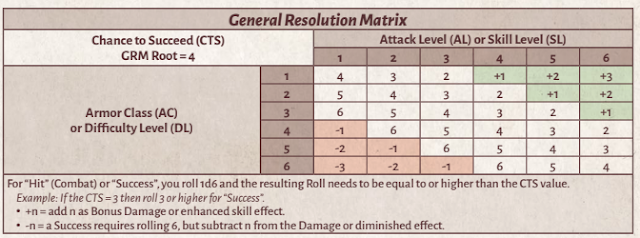Elthos RPG is a game written by my friend Mark Abrams (there is also a leaner Essentials version). It is free, so you can check it out for yourself if you prefer, or read my impressions before. Disclaimer: this brief overview was made at his suggestion. He calls it a "a medium-light weight traditional RPG". It makes sense. The game is not minimalist, but reasonable light - lighter than most versions of D&D, except maybe B/X.
It is one of those games that seems to be able to do much with little, thus punching a bit above its weight class (i.e., lots of possibilities for a reasonable page count).
Elthos has four basic classes, three basic attributes, only uses 1d6, but is in a sense similar to old-school D&D (in its races, classes, AC, skills, etc.).
Notice that this game does not advertise itself as being "compatible with OSR games" or any of that, but since I only play OSR games these days, I couldn't help but to notice that the numbers are apparently in the right ballpark - and I could see myself running old school adventures with this game (using some conversion).
It uses a simple matrix for all activities, which I'll reproduce here. I really like that this reminds me of Tagmar, but simpler and easier:
As you can see, to succeed you must roll 1d6+level against 3+level - thus giving you a 50% chance of beating someone of the same level.
The "red" and "green" parts allow you to go above your below your level. So, if your attack level (AL) is 4, you'll not only hit every time against AC 1, but also get +1 damage - simple and effective. Conversely, if your AL is 1 and the AC 4, you can still hit, but you need a 6 AND you get -1 damage.
Attributes (Strength, Dexterity and Wisdom) range from 1 to 6, giving you a modifier from -2 to +2 to certain things (similarly to OD&D, but streamlined). The skill list is of a decent size but choosing skills feels too crunchy due to niche protection and balance (e.g., thieves cannot usually learn Heavy Weapons unless they multi-class, some skills costs more points than others, etc.)
Everything is measured in this 1-6 scale (although you can go further with certain races, etc.). Levels are also in the 1-6 range usually - level 10 creatures exist, but they are demigods. It feels pretty close to my ideal level of detail. This is a PC from the book:
This works very well in practice. For example, life points are equal to STRxlevel (plus some optional additions). A STR 5 fighter has about 25 LP at level 5. Not that different from OD&D, but the math is simpler.
Mystic Points (used for spells and powers) work in a very similar way. Magic is very simple and clever - each has a power level that measures learning, cost and effect. For example, a thunderbolt spell that causes 6d6 damage costs 6 MP top cast and 6 learning points to learn. "Mystic damage" is separated from life points (they affect the mind rather than the body) - which both makes mages better against magic and non-mages have good uses for these points as well. It works for spells, miracles, psionic powers, etc. Some spells are immensely powerful but fumbles are deadly.
This might be my favorite aspect of the book. It is both easier and more balanced and flexible than old school D&D. Spells are very potent, but a simple +1 to combat also makes a huge difference, so fighters are equally tough. Warriors are susceptible to magic but mages are also susceptible to swords.
The book also has extensive (and mostly optional) rules for tactical combat, for folks who enjoy that.
This RPG leans heavily on the idea that the GM should create his or her own stuff, up to a point. The monsters, spells, feats, etc., are very few, with minimalist descriptions. The idea seems to be using this in conjunction with your own creations (especially with the Mythos Machine - see below) or other games.
So, overall, would I play this game? Yes! I might be tempted to simplify it even further, doing away with classes and class skills. This is easy to do out of the box: just let everyone be a freeman and pick any skill they want.
Another interesting aspect is this:
The Rules Book is designed as a stand alone product that can be used independently, but it is intended to be used in conjunction with The Mythos Machine, a web application that fully integrates the Elthos RPG Rules and provides World Building and Character Management Services (among other features). Together they form a powerful combination of fast-play and comprehensive computer support.
I've tried the app briefly (at Mark's suggestion), and it does seem very useful to create and save PCs, NPCs, and entire settings.
Anyway, you can access both the books and the app for free, so if this sounds interesting I'd definitely recommend checking it out.
DTRPG links are all Affiliate links - by using them, you're helping to support this blog!




Happy to see this review! I wonder, did you get a chance to give it a whirl? If so, how did it play in the wild? Thanks!
ReplyDelete